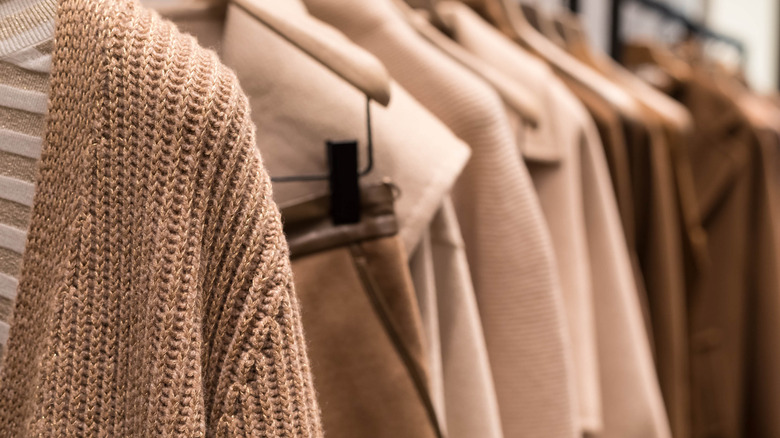Clothing Fabrics You Should Never Be Wearing In The Winter
Cold weather gives us a chance to layer our favorite cozy cardigans and jackets over dresses and our favorite tops. We finally get a chance to pull our soft wool sweaters and knee-high boots, items that are much too warm to wear any other time of the year, from the backs of our closets. There's also the chance you might be piling on fabrics that do nothing to keep you warm and everything to make you look bulky.
The best fabrics for winter are both insulating and warm, yet breathable enough that they don't trap in your body's moisture. Wearing wool tweed or flannel will ensure you stay dry and toasty because wool-based fabrics are excellent insulators: They trap air, which manages heat (via TeamClean). Merino wool and cashmere reign supreme because their fine, soft fibers allow for an excellent balance between warmth and breathability. They also naturally dry quickly, and most importantly, offer little to no itchiness (via Magnolia & Tulle).
But not all clothes advertised as winter wear are created equal. There are plenty of puffy jackets and sweaters on the market that may look warm but will actually leave you freezing. These are the following fabrics you should avoid wearing in the winter.
Avoid these fabrics when temperatures drop
You may look cute wearing clothes in some fabrics, but you won't be warm. Cotton, everyone's usual favorite, is actually one of the worst to wear in the winter. Even though cotton is a natural fiber, it absorbs moisture and doesn't hold on to heat very well. In extreme conditions, this can leave you shivering and wet, and even with hypothermia in the worst cases (via Magnolia & Tulle). The Mayo Clinic even states on their website that cotton does a poor job of holding body heat and recommends wool, silk, or polypropylene as alternate inner layers. Since sometimes you'll be unable to ditch cotton altogether, we suggest layering an insulating skin-tone colored top underneath.
Synthetic fabrics like polyester, acrylic, and rayon should also be avoided in the winter. They are not breathable, will trap heat, and make you sweat. However, it is worth mentioning that there are new technologies, especially in activewear, where synthetic performance fabrics have some advantages. For example, fleece is made from polyester. Outerwear often utilizes polyester fleece designed to keep you well insulated and dry using effective sweat-wicking technology (via Magnolia & Tulle).

